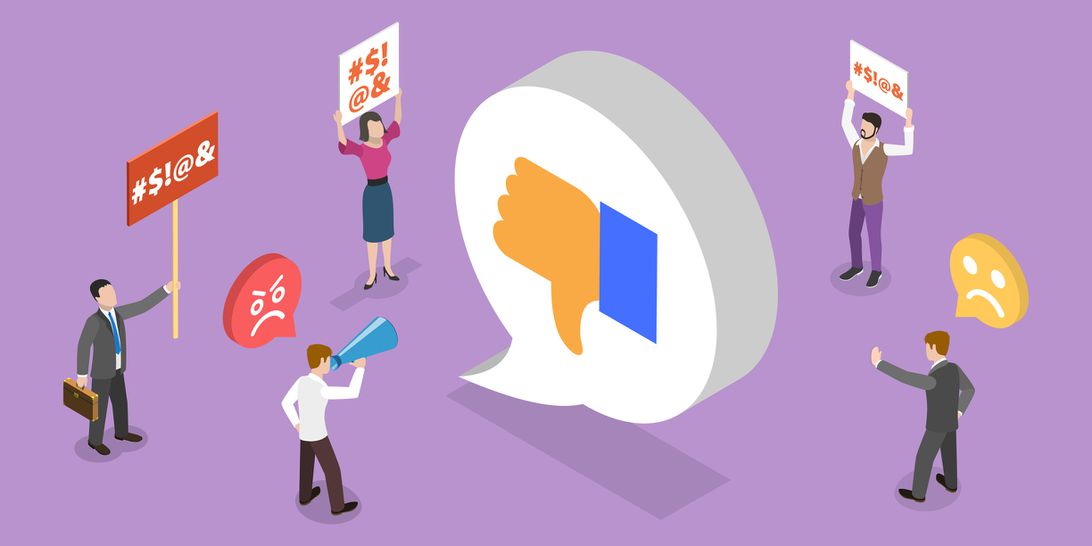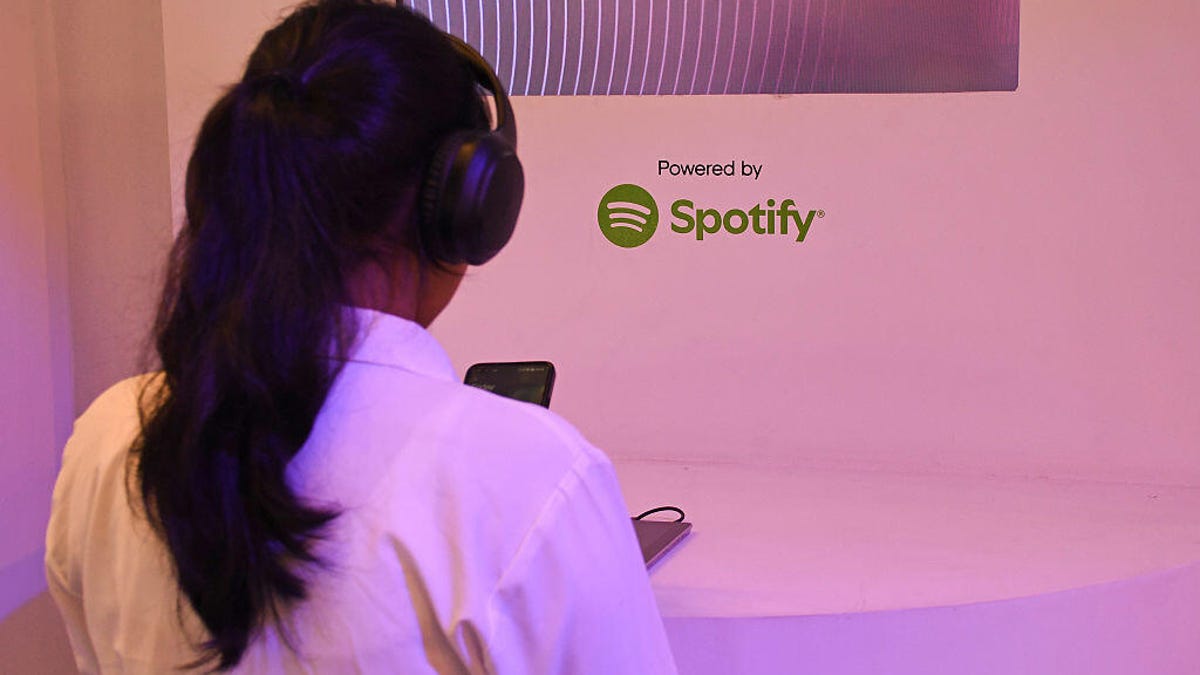Technologies
Social Media Should Censor Itself, Without Government Intervention, Most Americans Say
New polling from the firm Ipsos finds that most Americans worry about bad behavior on social media, and want companies to act.

Social media is getting under our skin, and new polling data shows that Americans want tech companies to fix it.
Surveys released by polling firm Ipsos on Monday show that a majority of Americans support content moderation on social networks, including putting warning labels on misinformation, deleting incitements to violence and suspending or banning offending accounts. Only 19% of Americans believe tech companies should do nothing and allow incitements to violence to be posted. Even fewer people, just 17%, believe social media companies should do nothing and allow posts containing misinformation or bullying.
«Basically, public opinion is giving license to tech companies to curate themselves,» said Cliff Young, president of US Public Affairs at Ipsos. He added that another Ipsos poll found that Americans don’t support government intervention with social media content. «What we see across the board is support for self-action» by tech companies, he said.
The Ipsos data, based on about 200 questions asked in eight polls over the past year and made available to the wider public Monday, offers an unusually clear indication of what Americans want social media companies to do about bad behavior on their platforms.
For much of the last decade, politicians, tech executives and people using the internet have argued about how much social media companies like Facebook, Twitter, Google’s YouTube and TikTok should moderate their platforms. Companies that track hate groups say the companies aren’t aggressively pulling down enough posts, while many politicians, including former President Donald Trump, say tech companies have gone too far.
In some cases, conservative politicians, including Florida Gov. Ron DeSantis and Texas Gov. Greg Abbott, have signed new laws aimed at punishing social media companies for «wrongful censorship» on their platforms. Though many of those efforts have struggled amid constitutional arguments in the courts, some of the loudest voices in American politics have made clear they believe big tech companies shouldn’t moderate potentially hateful, bullying or incendiary political speech.
Shortly after the US Capitol riots on Jan. 6 last year, tech companies including Twitter, Facebook and YouTube removed Trump and some of his most vocal advocates from their platforms. They cited concerns that Trump’s months long campaign of bullying, threats and lies about his election loss had sparked the carnage that left five people dead, including a Capitol Police officer. Trump has since released many statements denying his culpability, arguing instead that tech companies had acted wrongly. Trump’s actions related to the Jan. 6 riot led to his second impeachment by the US House of Representatives, and they’re a focal point for a bipartisan congressional commission investigating the event.
Young, at Ipsos, said the Capitol riots were a key moment when many Americans began to reexamine social media’s role in their lives.
Indeed, older polls from the Pew Research Center showed that before the 2020 election and 2021 riot, Americans were much more split about how to treat tech. A 2019 study by Pew found that 77% of Democrats thought social mediacompanies «have a responsibility to remove offensive content from theirplatforms.» By comparison, about 52% of Republicans had the sameview back then.
Fast-forward to 2021, when Ipsos polling performed in the months after the Capitol riots indicated that more Americans in both parties want tech companies to curb bad behavior online. «This was an inflection point for decision makers wanting to better understand the relationship between society and tech,» Young said.
Nuanced but similar views
Tech companies are among the most profitable, most valuable and most powerful businesses in the world. They’re also front of mind for many Americans, who rate disinformation, conspiracy theories, social media-driven radicalization and hacking above other big issues, like racism and the climate crisis. More than 79% of respondents to one Ipsos poll, in September, said they were concerned with at least one of those tech issues, roughly tying with «crime and public safety» and «the economy and jobs.»
Ipsos data also found that Republicans, Democrats and independents largely agreed on the importance of these issues, with hacking, malware and data breaches scoring among the top three concerns from all three groups.
Additionally, Ipsos surveys found that Americans largely understand the difference between social media companies and other tech giants, with 88% saying search engines and the ability to find things on the internet improved their lives, while only 45% felt the same about social media. When discussing specific companies, respondents saying they’re Republican or independent overall had a negative view of Facebook and Twitter, while less than 15% of Democrats viewed either company favorably. Google, Amazon, Microsoft and Apple were all viewed more favorably, Ipsos data showed.
Technologies
The FCC Just Approved Charter’s $34.5B Cox Purchase. Here’s What It Means for 37M Customers
Technologies
Spotify Expands Into Audiobook Rankings With Weekly Charts
The feature is available to both free users and Premium subscribers. Wuthering Heights is reaching the heights on both the US and UK charts.

If you’re a Spotify user, you may be familiar with features like the year-end summary Wrapped, as well as your daily usage stats. Now, the service has a new popularity chart tracking audiobooks.
Spotify’s audiobook charts are now available to free and Premium users within the service’s Audiobooks hub. While only Premium users receive 15 hours of audiobook listening per month, the company offers a larger selection of titles you can buy.
US charts and UK charts are both available now.
Read more: Best Music Streaming Services for 2026
Spotify says that the audiobook charts will help customers discover new and popular titles in real time.
«As we’ve proven with Music and Podcasts Charts, when content is easier to access, discover, and enjoy, the demand grows,» said Duncan Bruce, Spotify’s director of audiobook partnerships and licensing, in a statement on Friday.
Spotify launched audiobooks in 2022, and has since added features such as the AI catchup tool Recaps and PageMatch, which lets you swap more easily between a printed book and the audio version.
Spotify Premium currently costs $13 a month and includes more than 100 million songs, as well as audiobooks. Spotify Premium is currently CNET’s Editors’ Choice for best music streaming service.
The current US audiobooks chart lists Emily Brontë’s romantic classic Wuthering Heights as the top listen, followed by James Clear’s self-help book Atomic Habits and Freida McFadden’s psychological thriller The Housemaid. Audiobook popularity is also broken down by genre, with charts for romance, mystery and thriller books, self-help, science fiction and fantasy, biography and memoir, business and careers, teen and young adult, religion and spirituality, history, and parenting and relationships.
Powered by its blockbuster movie adaptation starring Margot Robbie and Jacob Elordi, Wuthering Heights also leads the overall chart for the UK.
Technologies
Today’s NYT Connections: Sports Edition Hints and Answers for Feb. 28, #523
Here are hints and the answers for the NYT Connections: Sports Edition puzzle No. 523, for Saturday, Feb. 28.

Looking for the most recent regular Connections answers? Click here for today’s Connections hints, as well as our daily answers and hints for The New York Times Mini Crossword, Wordle and Strands puzzles.
Today’s Connections: Sports Edition is a tough one. Chicagoans and southerners, you might have an advantage, at least with the blue and purple categories. If you’re struggling with today’s puzzle but still want to solve it, read on for hints and the answers.
Connections: Sports Edition is published by The Athletic, the subscription-based sports journalism site owned by The Times. It doesn’t appear in the NYT Games app, but it does in The Athletic’s own app. Or you can play it for free online.
Read more: NYT Connections: Sports Edition Puzzle Comes Out of Beta
Hints for today’s Connections: Sports Edition groups
Here are four hints for the groupings in today’s Connections: Sports Edition puzzle, ranked from the easiest yellow group to the tough (and sometimes bizarre) purple group.
Yellow group hint: Fore!
Green group hint: Take me out to the ballgame.
Blue group hint: Alma mater.
Purple group hint: Bear down.
Answers for today’s Connections: Sports Edition groups
Yellow group: Golf equipment.
Green group: Materials in a baseball.
Blue group: SEC school locations.
Purple group: First names of Chicago Bears.
Read more: Wordle Cheat Sheet: Here Are the Most Popular Letters Used in English Words
What are today’s Connections: Sports Edition answers?
The yellow words in today’s Connections
The theme is golf equipment. The four answers are club, glove, rangefinder and tee.
The green words in today’s Connections
The theme is materials in a baseball. The four answers are cork, rubber, leather and yarn.
The blue words in today’s Connections
The theme is SEC school locations. The four answers are Athens, Auburn, Lexington and Oxford.
The purple words in today’s Connections
The theme is first names of Chicago Bears. The four answers are Cairo, Caleb, Luther and Rome.
-

 Technologies3 года ago
Technologies3 года agoTech Companies Need to Be Held Accountable for Security, Experts Say
-

 Technologies3 года ago
Technologies3 года agoBest Handheld Game Console in 2023
-

 Technologies3 года ago
Technologies3 года agoTighten Up Your VR Game With the Best Head Straps for Quest 2
-

 Technologies4 года ago
Technologies4 года agoBlack Friday 2021: The best deals on TVs, headphones, kitchenware, and more
-

 Technologies5 лет ago
Technologies5 лет agoGoogle to require vaccinations as Silicon Valley rethinks return-to-office policies
-

 Technologies5 лет ago
Technologies5 лет agoVerum, Wickr and Threema: next generation secured messengers
-

 Technologies4 года ago
Technologies4 года agoOlivia Harlan Dekker for Verum Messenger
-

 Technologies4 года ago
Technologies4 года agoiPhone 13 event: How to watch Apple’s big announcement tomorrow
